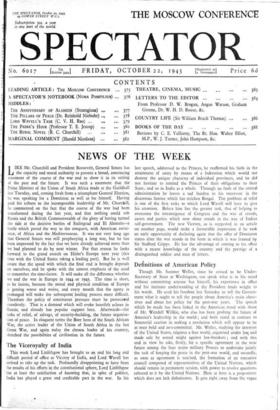The Viceroyalty of India
This week Lord Linlithgow has brought to an end his long and difficult period of office as Viceroy of India, and Lord Wavell has arrived to take up the task. Profoundly disappointing as have been the results of his efforts in the constitutional sphere, Lord Linlithgow has at least the satisfaction of knowing that, in spite of politics, India has played a great and creditable part in the war. In his last speech, addressed to the Princes, he reaffirmed his faith in the attainment of unity by means of a federation which would not destroy the • unique character of individual provinces, and he did not hesitate to remind the Princes of their obligations to their Statea and so to India as a whole. Through no fault of the centratl administration he leaves a sad burden to his successor in the disastrous famine which has stricken Bengal. The problem of relief is one of the first tasks to which Lord Wavell will have to give his attention. Before him lies the greater task, that of helping to overcome the intransigence of Congress and the war of creeds, castes and parties which now alone stands in the way of Indian self-government. The new Viceroy, as is suggested in an article on another page, would make a favourable impression if he took an early opportunity of declaring again that the offer of Dominion status after the war stands in the form in which it was framed by Sir Stafford Cripps. He has the advantage of coming to his office with a recent knowledge of the country and the prestige of a distinguished soldier and man of letters.


























